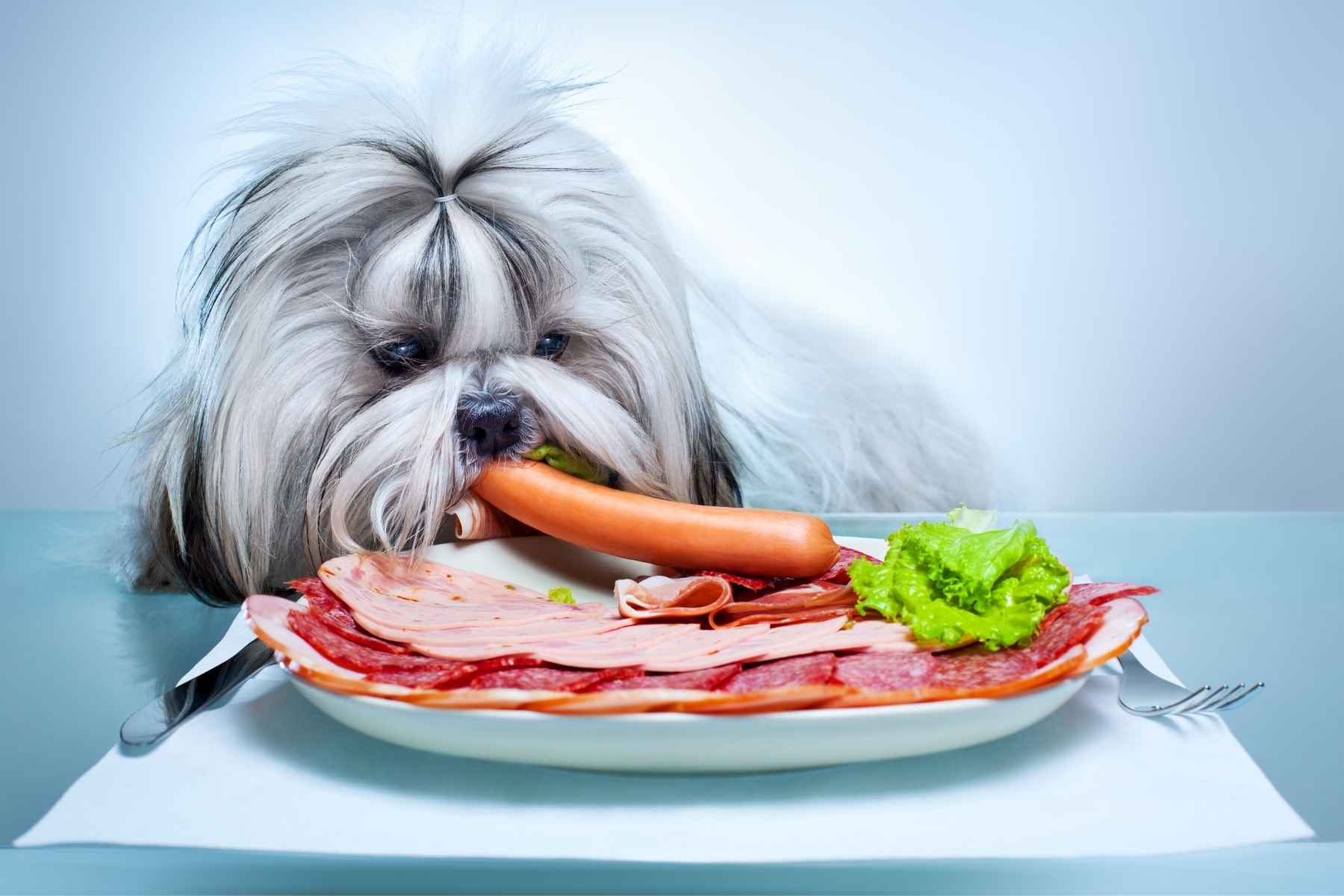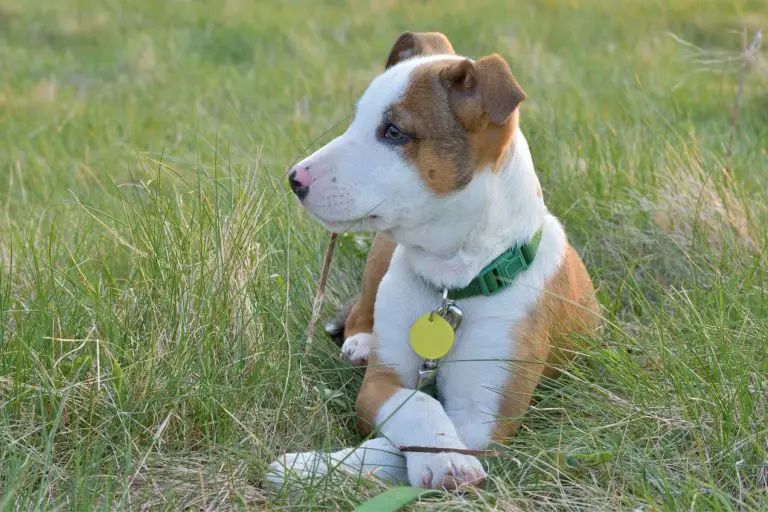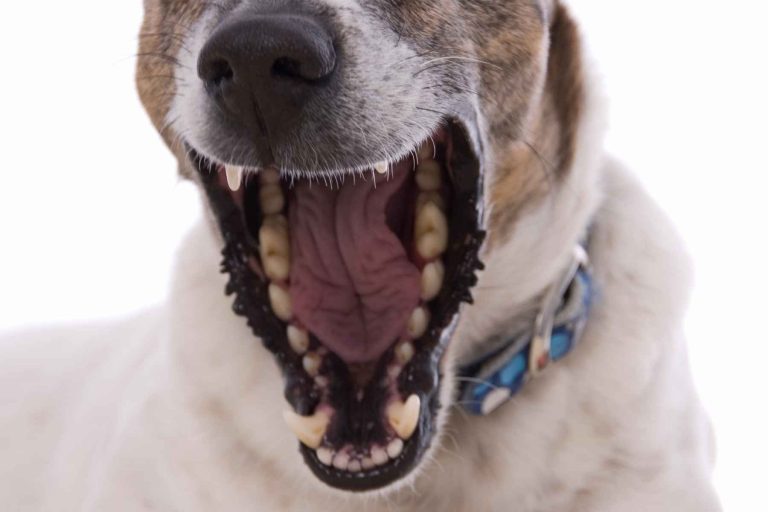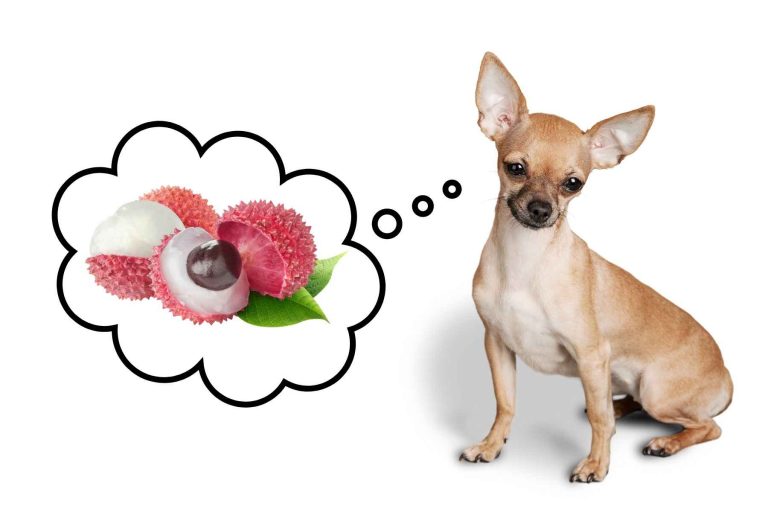Why Are Dogs So Greedy?

Have you ever wondered why dogs are willing to eat anything, anytime? The majority of dogs aren’t picky when it comes to food, and they usually don’t discriminate and will pretty much eat anything that you offer them. And it doesn’t even need to be dinner time either.
So, why are dogs so greedy? Dogs can be greedy for several reasons, including instinct, genetics, jealousy, joy, or hunger.
This article will discuss why dogs seem so greedy when it comes to food, and I will go over their instinct and other things that cause them to be greedy.
I will also cover the medical issues you should be aware of and the top five greediest breeds.
Why Are Dogs So Greedy?
The word greedy may not be entirely appropriate for some things. Dogs that are hungry or have to fight for their food aren’t really greedy. They are trying to survive.
This can be the case with jealousy or their genetics too. But when it comes to the dog that is fat and happy and just loves to eat, maybe we can use the word greedy!
Let’s look at some of the reasons why dogs may be considered greedy.
- Primal Instinct
- Jealousy
- Downright Hunger
- A Previous Shelter Dog
- They Expect it
Primal Instinct
Man’s best friend is descended from the wolf. Somewhere along the way, wolves became dogs and were domesticated. Scientists believe all dogs are descendants of the extinct gray wolves that lived almost 40,000 years ago.
Before domestication, food was scarce in the wild, and dogs and wolves needed to seize every opportunity to eat. Today, this instinct has carried through to dogs, explaining why dogs will counter surf for food or take food from a child.
Dogs also have a very high prey drive (some breed more than others) which is also a trait passed down from the wolf. Their instinct tells them to hunt for food because, in the wild, they had to scavenge, track down and kill their own food.
You may have thought your dog was being greedy around food if she acted aggressively, but in reality, this is actually a form of guarding that, again, goes back to their ancestor’s behavior.
Jealousy
Many dogs can easily get jealous of another pet and, in turn, get territorial around their owners. This can trigger reactions such as snapping or growling or even attacking.
This could happen if you have recently added a new pet to your family or if your dog sees you giving affection to another dog.
Dogs can also feel jealous of other humans, in some cases, children or a new baby. This is a situation where you need to be extremely careful.
Downright Hunger
If your dog is like mine, she always eats like she’s never going to eat again or hasn’t eaten in days. Of course, neither of these is the case, but all dogs seem to do this.
Much of it has to do with their instinct, as mentioned before. But in some cases, your dog may just be really hungry.
This can happen if there is a change if her daily food intake or nutritional needs. Your dog may show greediness if you’ve begun to feed her differently or at different times of the day.
If a dog is pregnant, her nutritional needs will change as she may want to eat more food. So what may look like greediness is actually her uptake in calories during pregnancy.
She Was a Shelter Dog
Often we see shelter dogs who exhibit signs of greediness with their food. Known as food guarding, some dogs will do anything to protect their food.
There is a good chance that dogs like this may have had to fend for themselves if they were stray. They have had to do everything to protect their food from other dogs or wild animals.
Food guarding can be as simple as running away with a piece of food or growling at anyone who approaches them. Some will even attack.
They Expect the Reward
I will admit that I am guilty as charged regarding this one. My dog has gotten so used to getting a treat whenever she comes in from going potty that she now demands it.
Dogs who are showered with treats will quickly discover that any greedy behavior is usually rewarded. My dog has gotten to the point where she expects a treat even if we walk through the same door.
When Greed is a Medical Issue
If we know there hasn’t been any significant change in our dogs’ diets, an increase in appetite can point to a medical problem.
In some conditions, your dog cannot digest and absorb the nutrients from her food the way she should. This can often cause their need to eat more to go into overdrive, to the point where they may just continue eating.
The following is a list of things that could be causing greediness or hunger in your dog.
- She’s Starving
- Diabetes
- Exocrine Pancreatic Insufficiency
- Hyperthyroidism
- Cushing’s Disease
- Bacterial Overgrowth
She May Actually Be Starving
You would most likely see this in a rescue or a shelter dog, but there are times when a dog may actually be starving.
Some breeds of dogs have a more pronounced ribcage than others so it may be perfectly fine. But in some cases, a visible ribcage is a warning that the dog isn’t being fed enough.
In general, you should be able to feel a dog’s ribs if you lay your hand against them. But if you can feel the entire shape of the rib, something may be wrong.
Diabetes
Dogs with an undiagnosed case of diabetes may exhibit signs of excessive hunger. You may notice she acts hungry all the time, even after she just ate. Diabetes can be a factor, especially if you see her eating more but losing weight.
Other signs of diabetes include an increase in water consumption and peeing more. She may also seem extremely tired or lethargic and have sweet-smelling breath.
Exocrine Pancreatic Insufficiency
EPI, which is the inability to produce enough pancreatic enzymes, can lead to improper absorption of needed nutrients.
EPI can cause an increase in hunger and, like diabetes, a noticeable weight loss. Other signs of EPI include fatty-looking stool, diarrhea, and vomiting.
Hyperthyroidism
Hyperthyroidism, which is an overactive thyroid, can also cause excessive hunger and weight loss. Your dog may gag or vomit and have difficulties swallowing.
She may show signs of increased thirst and diarrhea. Her heart rate may be rapid with a higher than usual rate of excitability.
Cushing’s Disease
Cushing’s disease is caused by an excess of cortisol in the blood. In addition to increased hunger, Cushing’s can cause increased thirst, high blood sugar, panting, and a rounded belly.
Bacterial Overgrowth in the Gut
Sometimes the number of bacteria in the GI tract can overgrow to the point where food is not absorbed through the bowels, leading to malabsorption.
In addition to increased hunger, dogs suffering from bacteria overgrowth will have weight loss and diarrhea that doesn’t’ seem to go away.
Greedy Breeds
There always seem to be those few in the dog world that stand out for one reason or another. Some breeds never seem to be satisfied, especially around food.
I’ve listed some particularly greedy breeds and what makes them that way.
- English Bulldogs
- Beagles
- Rottweilers
- Dachsunds
- Labrador Retreivers.
English Bulldogs
English Bulldogs are notorious for being greedy eaters and will gladly overeat if given a chance. But these dogs gain weight quickly, so you want to watch what they are eating to avoid obesity.
Beagles
Beagles seem to have a hard time regulating their appetites due to the fact that they were used in large packs to hunt.
This heritage makes them excellent scavengers. Hunting dogs use a tremendous amount of energy and are always looking for their next meal.
Rottweilers
Most Rotti owners know the look they get from their dog that says, “Feed me.” Rotties are always there when you open the fridge, too, waiting for any opportunity to eat.
Rottweilers actually possess a food motivation gene that causes them never to feel full. I guess it’s in their DNA, so how can we fault them for that?
Dachshunds
Don’t be fooled by the little wiener dog. That little body can eat and eat. They can be very greedy regarding food, but this needs to be watched. They can gain weight quickly, which is not good for their delicate backs.
Labrador Retriever
Like the Rottweiler, the Labrador Retriever is genetically predisposed to never feeling full. This causes them to be counter surfers or stand in front of you, drooling as you eat that cheeseburger.
Conclusion
This article has helped us to understand why dogs are so greedy. Mostly, it’s an instinct that has been with them for centuries.
In some cases, it can be a medical condition. We’ve also learned the top five greediest dog breeds. Do you have one of them?






